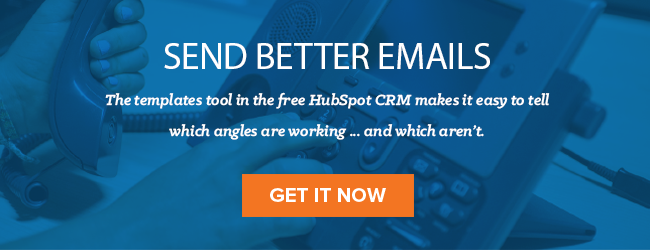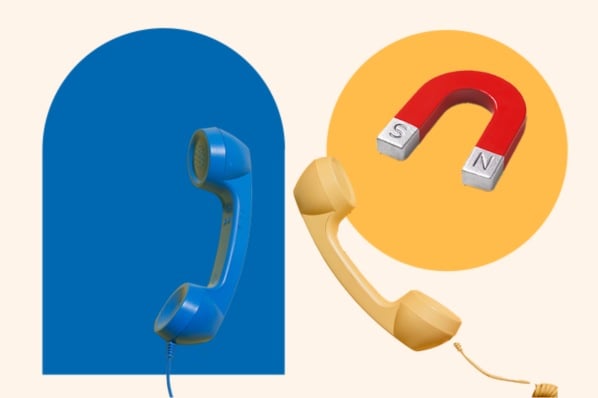Some salespeople develop a gut instinct for knowing when their prospects are losing interest. This “spidey sense” is highly useful: If you can identify when a good-fit buyer is about to slip away, you can devote some extra energy to reeling them back in. That’s far more productive than losing the deal and being forced to start from scratch with a new prospect.

Fortunately, you can pick up on a buyer’s declining interest without impressive levels of intuition. Certain phrases signal your prospect just isn’t that into your product. If you hear any of these six statements, you’re in trouble and should reassess your strategy.
1) “My schedule is jam-packed for the next few [days, weeks, months], so I’ll get back in touch as soon as it clears up.”
Prospects usually give a variation on the “busy” line when they’re trying to politely blow you off. If a project or issue is a true priority, they’ll make time for it.
If you commonly get this response when you’re first speaking to buyers, take an objective look at your emails, voicemails, and social media outreach. Are they personalized and helpful? Do they focus on your prospects, rather than your product, brand, and company? Are you using trigger events to identify buyers who need your offering right now? Answering “no” to one or more of these questions may explain why you’re not booking more meetings or calls.
If you typically hear this line after a formal presentation, you’re probably not connecting your prospects’ unique challenges and situation to your product. Buyers aren’t convinced by generic, one-size-fits-all messaging. To win their business, you need to investigate their needs and tailor your presentation accordingly.
2) “I’m not ready to bring in my boss.”
Many decision makers assign direct reports to do initial research and narrow down a wide range of vendors.
Salespeople should expect to work with junior stakeholders across multiple deals. But it’s a red flag when your point of contact won’t bring in the economic buyer. This reluctance shows she’s not interested enough in your product to spend her boss’s time discussing it, or that she’s not confident she can make the case to her manager.
To uncover her reasons for delaying, ask, “What reservations do you have about the product?” or “Are you open to moving forward?”
You can also take a more direct approach and say, “At this point in the conversation, my clients usually bring in their managers. Do you have any concerns stopping you from involving your manager?”
If you discover your prospect doesn’t feel optimistic she can bring her boss on board, give her the tools she needs to sell him. Ask her what his personal and professional goals are, then work with her to develop ways your product can help him accomplish those objectives.
In addition, determine the objectives her boss will likely have and coach your point of contact on addressing them. Maybe she suspects your product’s lack of customization options will concern him -- so you give her two testimonials from customers who used your offering as-is to solve challenges nearly identical to the one your prospect is facing.
3) “We don’t have the budget.”
Depending on where you are in the sales process, this objection may mean:
- “I don’t want to talk.” (Connect)
- “You haven’t demonstrated the product’s value.” (Demo)
- “I’m looking for a discount.” (Negotiation)
If one of the first statements out of your prospect’s mouth is, “I can’t buy anything right now, I’ve maxed out my budget,” or “Sorry, we have no funding,” it’s probably a brush-off. She may change her tune when she realizes your product’s ROI, so steer the conversation to value. You’ll know price is a real stopping point if it comes up again.
Sample responses include:
- “That’s okay. I don’t expect you to buy anything right now. Let’s explore whether [product] can help you [solve relevant challenge]. Can we schedule a follow up call on [date and time]?”
- “I'm not looking to sell you anything at this point. First, we should see if there's a good fit between our services and your needs. At that point, we can talk about pricing.”
- “It doesn’t benefit [rep’s company] to sell to someone who’s a bad fit. I need to know whether [product] will have a significant ROI for you before we discuss an agreement.”
Hearing this objection during the later stages of the sales process means you need to reestablish value. Try providing a free trial, sample, or relevant case studies to drive home the potential impacts of your product.
When your prospect says “We can’t afford this,” during the negotiation stage, it’s not always a sign you’re losing the deal. On the contrary, it’s possible your prospect is interested enough to look for a discount. If you’ve previously discussed pricing and it wasn’t an issue, consider adjusting the cost in exchange for a concession (like more favorable payment terms or an accelerated purchasing timeline). Alternatively, you can respond with silence. If they don’t need a discount, an awkward pause may lead them to backtrack.
If you haven’t talked about pricing until this point, determine whether the buyer is angling for a discount or truly doesn’t have the money. You can determine this by asking about the details of their budget: Who allocates it? When does it renew? Can you help them get executive sponsorship so they pay for the product sooner rather than later?
Try to establish the return her company stands to gain with your product. Where there’s a will, there’s usually a way: If your offering will significantly benefit her business, she can probably find the money somewhere.
4) “[Competitor] is [cheaper, more reliable, more advanced, more established].”
There are two likely reasons your prospect will praise your competitor. First, she might be trying to gain leverage. If you believe she favors a different seller, you’ll probably make greater compromises during negotiation. Second, the buyer may genuinely believe another vendor’s product is better.
In either case, you might be tempted to contradict her. But slamming your competitor won’t do you any favors. Instead, refocus the conversation by asking, “Why do you think so?”
If that doesn’t get you enough information, follow up with, “Is [price, reliability, X feature, reputation] one of your top priorities?”
Once you’ve clarified your prospect’s priorities, you’ll know whether your product is a good fit. If you can’t support her needs, your time will be better spent on other deals.
5) “Sorry I didn’t show up to our meeting. Something came up.”
Everyone deals with occasional last-minute plan changes. If your prospect misses a scheduled conversation, give her another chance.
But if she doesn’t show up a second time, consider moving on. Failing to show up without explanation shows the buyer doesn’t respect your time or authority. While she may have been interested enough in your product to start the sales conversation, it’s definitely no longer one of the most time-sensitive or important projects on her plate.
Keep trying to meet with her, and you’ll likely end up with unexpected gaps in your schedule.
Diplomatically walk away with a message along these lines:
Hi [prospect name],
I understand if [solving X challenge] isn’t one of your top priorities at the moment. Let me know if that changes. Also, good luck with [current initiative #1] and [current initiative #2].
Best,
[Your name]

6) “[Feature/product characteristic] is fairly important to us. Are you planning on [adding/offering] that soon?”
Your product might be an ideal fit for the buyer in every way but one. Unfortunately, if she believes the missing feature, capability, or option is crucial to her company or use case, you probably won’t win her business.
Is there a workaround you can suggest? For example, perhaps she’s looking for office desks that can be raised and lowered so employees can sit or stand as they’d like. Your desks are fixed height. However, because her order would be 300% larger than your average one, you can throw in 20 permanently standing desks at no extra cost. It’s not a perfect solution -- but it gives her employees the ability to stand while they work.
If you don’t have a workaround, explain why your product doesn’t come with that feature. Perhaps the buyer wants two times as much storage as your software provides. You might say, “We decided to cap storage at the current amount because none of our 1,000 customers are anywhere close to reaching the limit. Avoiding those unnecessary server costs allows us to keep your monthly rate low.”
Keep your ears peeled for these six phrases. While hearing them usually isn’t a good sign, it’s better to know your prospect is losing interest now -- when you still have time to re-engage them -- than later, when they’ve taken up more of your time just to go dark.


![How to Use BANT to Qualify Prospects in 2024 [Expert Tips]](https://www.hubspot.com/hubfs/bant-questions-6606f7b6c0d9e.webp)


![21 Signs Your Buyer Is a Poor Fit [Sales Process Checklist], According to HubSpot's Former Sales Director](https://www.hubspot.com/hubfs/Bad%20fit%20checklist.jpg)




